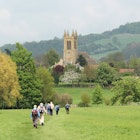Nestled into the hollows of its seven enfolding hills, honey-hued and historic Bath – all Regency splendour and Jane Austen ambience amid Somerset’s comely countryside – is best seen from on high.
Bathe above Bath
There’s been a settlement here for nearly 3,000 years, since King Bladud reputedly wallowed in the local mud and was cured of his leprosy. In AD 44 the Romans founded Aquae Sulis on the site, building a grand complex around the healing waters – which you can still visit today.
In addition, the freshly refurbished Thermae Bath Spa is the impressive 21st-century incarnation of a Roman bathhouse. It’s also one of the best places to get an overview of the city as the rooftop mineral pool, a constant 33.5°C, looks over the Abbey and surrounding streets; visit at twilight to stew in the waters as the sun goes down over the city.
Walk and ride the Skyline
The city’s seven hilltops offer countryside on the doorstep and the chance to see Bath from every angle.
The Skyline Walk (www.nationaltrust.org.uk/main/w-bath_skyline_walk.pdf) is the best way to discover both. Though popular – in 2010 it was revealed as the route guide most often downloaded from the National Trust – this 10km circuit feels far from crowded.
Starting from the University of Bath, the trail links quiet woodland, rare wildlife, an Iron Age hill fort and architectural glories. The best views of the city are from Bathwick Hill and, just off the route, the 18th-century ‘Sham Castle’ – like a Hollywood film set, a magnificent-looking façade with nothing behind it.
On the walk, stop off at Prior Park (www.nationaltrust.org.uk/priorpark). The landscaped gardens (part designed by Capability Brown) encompass a lake, blooming flowerbeds and a rare Palladian bridge – plus great lookouts over the city’s spires.
One word of caution – Bath’s hills make for steep walking. The Skyline open-top bus tour, a hop-on, hop-off drive linking some of the same sites, takes the strain out of visiting the city’s higher reaches.
City highs
For views without leaving the city centre, climb the 212 steps of Bath Abbey on a Tower Tour (www.bathabbey.org). This guided trip grants access above the vaulted ceiling, behind the clockface and up onto the roof of the grand 15th-century building.
An alternative lookout, 40m-high Beckford’s Tower (Lansdown Road; www.bath-preservation-trust.org.uk) was built as study-with-a-view for a 19th-century eccentric; today you can ascend the 154 steps to the top, via the first-floor museum.
For a more refreshing outlook, the roof terrace of the Halls and Woodhouse bar and restaurant (Old King St; www.hall-woodhousebath.co.uk) may not be the city’s highest point, but it’s a good place to toast your surrounds.
Alternative highs
Alexandra Park, south of the train station, is at the top of Beeches Cliff – it’s a breathless slog up Jacob’s Ladder, but the panorama from the top is worth the effort.
Royal Victoria Park, west of Bath’s show-stopping Royal Crescent, doesn’t have the same altitude advantage as Alexandra Park, but it’s where the city’s hot-air balloon operators launch their baskets, offering floats above the city and beyond.
Just northeast of the city, 191m Solsbury Hill – celebrated by Peter Gabriel in his eponymous song – is a prime spot for views over Bath and the Avon Valley. A flat-topped summit, site of another long-gone Iron Age fort, it’s also a good place to look for chalkhill blue butterflies and skylarks.
And finally, who can argue with a name? Just behind Camden Crescent, a Regency sweep with its own impressive vistas, sits the city’s most ideally titled lookout: Perfect View Road – which does exactly what it says on the tin.
For more information go to www.visitbath.co.uk











